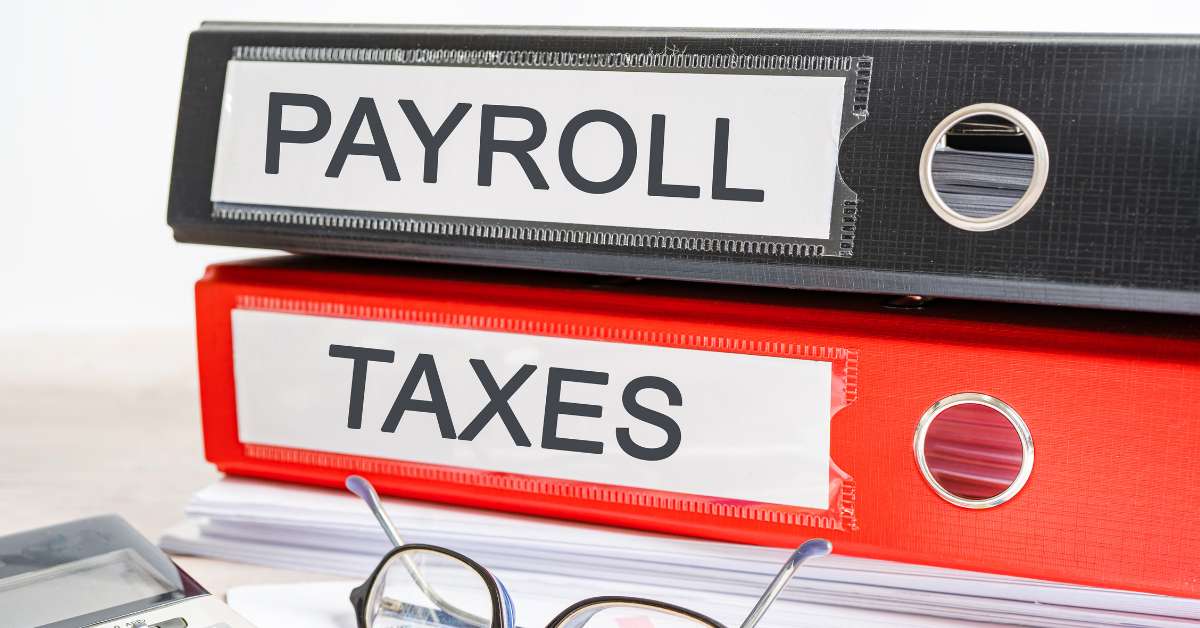Language:
Payroll Tax Essentials for Small Business Owners

As a small business owner, understanding and managing payroll taxes is crucial for maintaining compliance and ensuring the financial stability of your company. Payroll tax for small businesses refers to the taxes that employers are required to withhold from their employee’s wages and pay to the appropriate government agencies. These taxes fund important social programs such as Social Security, Medicare, and unemployment benefits.
Read on to learn the intricacies of payroll taxes, and gain the knowledge and tools necessary to navigate this complex aspect of running a small business successfully.
What Are Payroll Taxes?
Payroll taxes are specific taxes that employers are required to deduct from their employee’s wages and remit to the appropriate government entities. These taxes are used for funding various social programs and benefits. Small businesses, like any other employers, must understand the different types of payroll taxes to ensure compliance with tax regulations and financial stability.
Common Types of Small Business Payroll Taxes
Here are some of the most common types of small business payroll taxes:
Federal Insurance Contribution Act (FICA) Taxes
One significant type of payroll tax is the Federal Insurance Contribution Act (FICA) tax. FICA comprises two components: Social Security tax and Medicare tax. Employers and employees each contribute to these taxes.
As of 2023, the Social Security tax rate is 6.2% for both employers and employees, based on the employees’ wages up to a certain income threshold ($160,200 in 2023). The Medicare tax rate is 1.45% for both employers and employees, with no income cap.
Additional Medicare Tax
In addition to FICA taxes, there is an Additional Medicare Tax that applies to high-income individuals. This tax is an extra 0.9% on wages exceeding $200,000 for single filers or $250,000 for married couples filing jointly.
Federal Unemployment Tax Act (FUTA) Taxes
The Federal Unemployment Tax Act (FUTA) tax is a payroll tax that helps fund unemployment benefits provided to workers who have lost their jobs. Employers are responsible for paying FUTA taxes based on their employees’ wages.
The FUTA tax rate is set at 6% on the first $7,000 of wages paid to each employee. This means that employers contribute 6% of the initial $7,000 of each employee’s wages towards FUTA taxes.
Businesses may be eligible for a tax credit by paying state unemployment taxes, which can lower the effective FUTA tax rate to as low as 0.6%. To ensure compliance and take advantage of potential credits, it is advisable for businesses to consult with a qualified tax preparer and submit the necessary forms.
State Unemployment Tax Act (SUTA) Taxes
State Unemployment Tax Act (SUTA) taxes are payroll taxes imposed by individual states to fund state-level unemployment benefits. The specific rates and regulations for SUTA taxes vary among states. Employers are required to pay SUTA taxes based on their employees’ wages.
The rates are set by each state and often vary depending on factors such as the employer’s industry and the amount of wages paid to employees. State-specific income thresholds may also apply, beyond which employers must pay SUTA taxes.
It is important for small business owners to familiarize themselves with the SUTA tax regulations in their state and accurately calculate and remit these taxes.
State and Local Payroll Taxes
State and local payroll taxes refer to various taxes imposed by state and local governments on employers and employees. These taxes can include income taxes, disability taxes, and local taxes.
The rates, regulations, and types of state and local payroll taxes vary depending on the specific state and locality in which the business operates. The percentages or amounts for these taxes are determined by the respective state or local tax authorities.
Small business owners should consult the tax guidelines provided by their state and local authorities to understand the specific requirements and rates for state and local payroll taxes applicable to their business.
How to Calculate Payroll Taxes for Small Businesses?
When it comes to calculating payroll taxes for small businesses, there are several key steps to follow. By carefully navigating through these steps, you can ensure accurate and compliant calculations of payroll taxes.
Determine Taxable Workers
The first step is to determine which workers are subject to payroll taxes. Generally, most employees are subject to payroll taxes, but there may be exceptions such as independent contractors. To determine taxable workers, review their employment status and consult the guidelines provided by tax authorities. It is important to correctly classify workers to avoid potential penalties or misreporting.
Determine Taxable Wages
Next, you need to determine the taxable wages for each employee. This includes regular wages, salaries, and bonuses. Consider any pre-tax deductions, including contributions to retirement plans or health insurance premiums, since they can impact the taxable wages.
Calculate Withholding Amounts
Once you have determined the taxable wages for each employee, you can proceed to calculate the withholding amounts for payroll taxes. This involves deducting the appropriate amounts for federal income tax, Social Security tax, Medicare tax, and any applicable state or local taxes.
The withholding amounts are based on the employee’s income, tax brackets, and tax rates provided by tax authorities. Consult the tax withholding tables or use reliable payroll software to calculate accurate withholding amounts.
How to Report and Pay Payroll Taxes?
Reporting and paying payroll taxes involves several important steps for small businesses. While the specific process may vary depending on the country and jurisdiction, here is a general overview of how to report and pay payroll taxes:
Obtain an Employer Identification Number (EIN)
Before you can report and pay payroll taxes, you typically need to obtain an Employer Identification Number (EIN) from the relevant tax authority. This unique identifier is used to identify your business for tax purposes.
Determine the Reporting Frequency
The tax authority will specify the frequency at which you need to report and remit payroll taxes. This could be monthly, quarterly, or annually. It is important to be aware of the reporting deadlines to avoid penalties or interest charges.
Keep Accurate Payroll Records
Maintain comprehensive records of your employee’s wages, tax withholdings, and other relevant payroll information. These records will be essential for accurately reporting payroll taxes and addressing any potential inquiries from tax authorities.
Complete Payroll Tax Forms
Depending on your jurisdiction, you will need to complete specific payroll tax forms provided by the tax authority. These forms typically require you to provide information such as the total wages paid, tax withholdings, and employer contributions.
Calculate Payroll Tax Liabilities
Calculate the total amount of payroll taxes you owe based on the information recorded in your payroll records. This includes both the employer’s and the employee’s portion of taxes.
Remit Payroll Taxes
Pay the calculated payroll tax liabilities to the tax authority within the designated reporting period. This can usually be done electronically through an online payment system or by mailing a check or money order.
File Payroll Tax Returns
Submit the completed payroll tax forms to the tax authority, along with any required supporting documentation. This notifies the tax authority of the wages paid, tax withholdings, and contributions made by the employer.
Maintain Compliance
Regularly review and update your payroll processes to ensure ongoing compliance with payroll tax regulations. Stay informed about any changes in tax laws or reporting requirements that may affect your business.
Small Business Payroll Tax Tips
To effectively manage payroll taxes and ensure the financial stability of your small business, here are some important tips to keep in mind:
File Payroll Taxes on Time
It’s very important for small businesses to file payroll taxes on time. Late or missed filings can result in penalties, interest charges, and even audits by tax authorities. By adhering to the designated reporting and payment deadlines, you can avoid these consequences and maintain a positive relationship with the tax authorities. Set up reminders or utilize payroll software that includes automated tax filing features to help ensure timely submissions.
Stay Compliant with Payroll Tax Regulations
Compliance with payroll tax regulations is of utmost importance. Familiarize yourself with the specific tax laws and regulations relevant to your business and location. Stay updated on any changes or updates to these regulations. Non-compliance can lead to penalties, fines, and potential legal issues. Regularly review your payroll processes to ensure accuracy and compliance.
Outsource Payroll Tax Services
Managing payroll taxes can be complex and time-consuming. Consider outsourcing your payroll tax services to professional firms or using reliable payroll software. Outsourcing can help ensure accurate calculations, timely filings, and compliance with tax regulations.
Professional service providers or software can handle tasks such as calculating tax withholdings, generating payroll reports, and filing tax forms. This allows you to focus on other critical aspects of running your business while minimizing the risk of errors in payroll tax management.
Simplify Payroll and Boost Efficiency
The accurate calculation, reporting, and timely payment of payroll taxes are essential not only to comply with legal requirements but also to maintain financial stability and avoid penalties or legal issues. Filing payroll taxes on time demonstrates your commitment to fulfilling your tax obligations and establishes a positive relationship with tax authorities.
To alleviate the burden of managing payroll and ensure accurate bookkeeping, consider utilizing Doola’s services. Doola offers comprehensive bookkeeping solutions that can help streamline your payroll processes, including payroll tax calculations, filing, and reporting. By outsourcing your payroll needs to Doola, you can focus on other core aspects of your business while ensuring compliance with payroll tax regulations.
FAQs
Where can small business owners find info about payroll tax changes?
Small business owners can find info about payroll tax changes from sources like government tax authorities, official websites, tax publications, newsletters, and updates from accounting and tax organizations. Check websites regularly for the latest updates.
Can small business owners apply for payroll tax exemptions?
Yes, small business owners may qualify for payroll tax exemptions or credits based on location and circumstances. They should check the guidelines from tax authorities or ask accountants for advice on eligibility.
How can a small business owner ensure they’re paying the correct payroll tax amount?
To ensure correct payroll tax payments, small business owners should stay updated on tax regulations, keep accurate records, and use reliable payroll software or professionals for calculations and compliance checks.
How can a small business owner reduce their payroll tax burden?
Small business owners can reduce the payroll tax burden by exploring tax credits, evaluating worker classification, considering employee benefits with tax advantages, and seeking guidance from accountants or tax professionals.
Can payroll taxes be deducted on a small business tax return?
Payroll taxes like employer’s Social Security and Medicare taxes (FICA) cannot be directly deducted on a small business tax return. However, eligible expenses related to payrolls, like wages and benefits, can be deducted as ordinary business expenses. Consult a tax professional for accurate advice.








